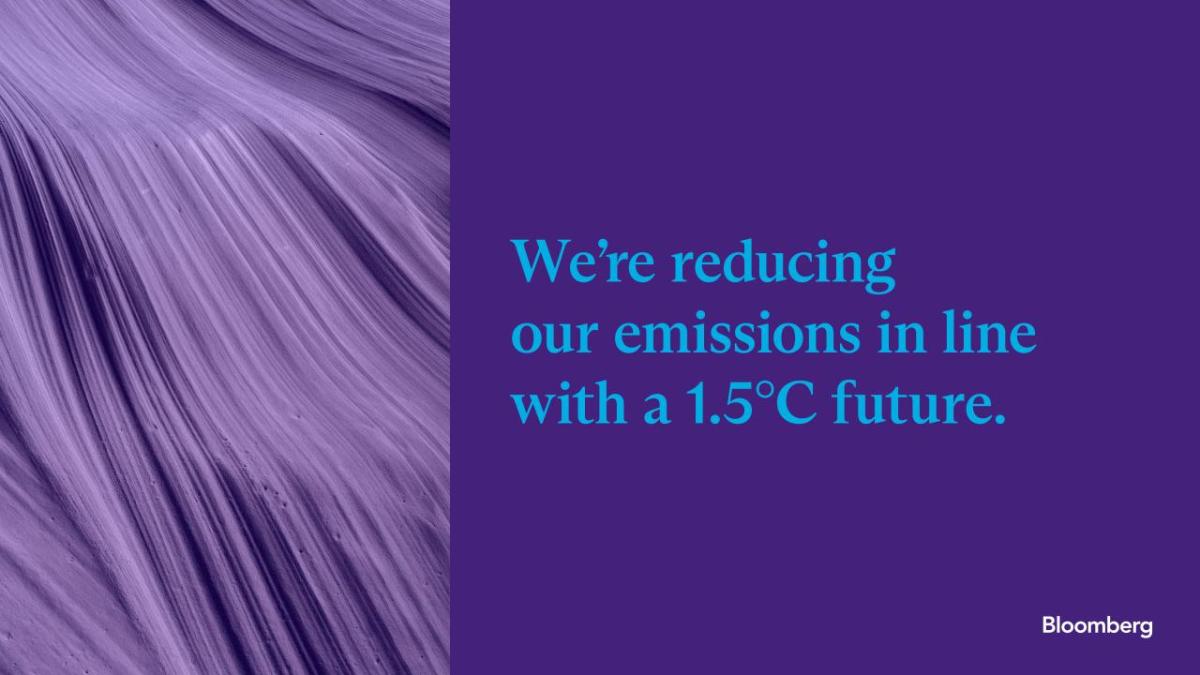Bloomberg 2023 Impact Report: Reducing Our Emissions

Originally published in Bloomberg's 2023 Impact Report
Bloomberg strives to decouple company growth from environmental impact while increasing the efficiency and resiliency of our operations. Our environmental performance targets are aligned with multinational efforts to limit the global temperature rise to 1.5°C above pre-industrial levels and avoid the most severe impacts from climate change.
Carbon emissions reductions and targets
Bloomberg is committed to reducing the company’s greenhouse gas (GHG) emissions in line with a 1.5°C future and has set both near- and long-term emissions reductions targets.
In February 2023, the Science Based Targets initiative (SBTi) validated Bloomberg’s long-term science-based net-zero target to reduce absolute emissions by 90 percent for Scope 1, 2 and 3 emissions by 2040 (from a 2018 baseline). As an interim step on that journey, SBTi had previously validated Bloomberg’s near-term science-based targets to reduce absolute Scope 1 and 2 emissions by 80 percent and absolute Scope 3 operational emissions by 30 percent, both by 2030 (from a 2018 baseline).
Our long-term science-based target includes achieving the reductions required to meet our near-term Scope 1, 2 and 3 targets plus reductions in additional areas of Scope 3 emissions, considered “value chain” categories. These additional categories comprise the environmental impact of Bloomberg’s purchase of capital goods, employee commuting and equipment in use at customer sites. We are in the process of refining calculations for emissions in these categories, as well as expanding the breadth of existing Scope 3 categories, and will report on these results in a subsequent Impact Report.
We remain committed to our RE100 pledge to obtain 100 percent of our electricity from renewable sources by 2025 primarily through long-term Power Purchase Agreements (PPAs) and energy supply contracts. Achieving our RE100 objective will satisfy the 80 percent reductions in Scope 1 and 2 emissions required to meet our near-term science-based target.
Pursuing comprehensive energy goals
As a company with more than 25,000 employees based in 155 locations around the world, addressing our global energy consumption is critical to reducing our environmental impact and achieving our science-based net-zero targets. Bloomberg’s energy strategy is comprehensive, focusing on reducing absolute energy consumption, implementing energy efficiency projects at our facilities, occupying environmentally certified new facilities and investing in developing both on- and off-site renewable energy projects.
Bloomberg’s energy profile is dominated by electricity, comprising 93 percent of our total energy consumption. Fuel usage, refrigerant gasses and natural gas consumption account for the remaining 7 percent of energy use. In 2023, we consumed 373 million kilowatt hours (kWh) of electricity across our global operations, an increase of 6 percent from 2022, largely driven by a 9 percent increase in data center energy consumption resulting from increased capacity.
Read Bloomberg's 2023 sustainability report to learn more about its environmental impact.

